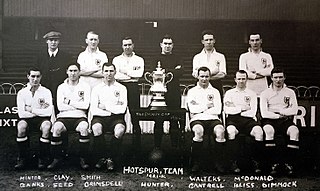The 1963–64 FA Cup was the 83rd staging of the world's oldest football cup competition, the Football Association Challenge Cup, commonly known as the FA Cup. West Ham United won the competition for the first time, beating Preston North End 3–2 in the final at Wembley.
The 1935–36 FA Cup was the 61st season of the world's oldest football cup competition, the Football Association Challenge Cup, commonly known as the FA Cup. Arsenal won the competition for the second time, beating Sheffield United 1–0 in the final at Wembley, through a late goal from Ted Drake.
The 1934–35 FA Cup was the 60th season of the world's oldest football cup competition, the Football Association Challenge Cup, commonly known as the FA Cup. Sheffield Wednesday won the competition for the third time, beating West Bromwich Albion 4–2 in the final at Wembley, winning through two late goals from Ellis Rimmer.
The 1933–34 FA Cup was the 59th season of the world's oldest football cup competition, the Football Association Challenge Cup, commonly known as the FA Cup. Manchester City won the competition for the second time, beating Portsmouth 2–1 in the final at Wembley, winning through two late goals from Fred Tilson.
The 1922–23 FA Cup was the 48th season of the world's oldest association football competition, the Football Association Challenge Cup. Bolton Wanderers won the competition, beating West Ham United 2–0 in the first final to be held at Wembley Stadium, London.
The 1931–32 FA Cup was the 57th season of the world's oldest football cup competition, the Football Association Challenge Cup, commonly known as the FA Cup. Newcastle United won the competition for the third time, beating Arsenal 2–1 in the final at Wembley.
The 1929–30 FA Cup was the 55th season of the world's oldest football cup competition, the Football Association Challenge Cup, commonly known as the FA Cup. Arsenal won the competition for the first time, beating Huddersfield Town 2–0 in the final at Wembley.
The 1927–28 FA Cup was the 53rd staging of the world's oldest football cup competition, the Football Association Challenge Cup, commonly known as the FA Cup. Blackburn Rovers won the competition for the sixth and final time, beating Huddersfield Town 3–1 in the final at Wembley.
The 1914–15 FA Cup was the 44th season of the world's oldest association football competition, the Football Association Challenge Cup, and the last to be held before the cancellation of all football competitions since due to World War I. Sheffield United won the competition for the third time, beating Chelsea 3–0 in the final at Old Trafford, Manchester.
The 1919–20 FA Cup was the 45th season of the world's oldest association football competition, the Football Association Challenge Cup, and the first since the cancellation of all football competitions due to the First World War. Aston Villa won the competition, beating Huddersfield Town 1–0 in the final at Stamford Bridge, London.

The 1920–21 FA Cup was the 46th season of the world's oldest association football competition, the Football Association Challenge Cup. Tottenham Hotspur won the competition, beating Wolverhampton Wanderers 1–0 in the final at Stamford Bridge, London.
The 1921–22 FA Cup was the 47th season of the world's oldest association football competition, the Football Association Challenge Cup. Huddersfield Town won the competition, beating Preston North End 1–0 in the final at Stamford Bridge, London.
The 1923–24 FA Cup was the 49th season of the world's oldest football cup competition, the Football Association Challenge Cup, commonly known as the FA Cup. Newcastle United won the competition for the second time, beating Aston Villa 2–0 in the final at Wembley.
The 1908–09 FA Cup was the 38th staging of the world's oldest association football competition, the Football Association Challenge Cup. Manchester United won the competition for the first time, beating Bristol City 1–0 in the final at Crystal Palace, through a goal from Sandy Turnbull.
The 1911–12 FA Cup was the 41st season of the world's oldest association football competition, the Football Association Challenge Cup. Barnsley won the competition for the first time, beating West Bromwich Albion 1–0 after extra time in the replay of the final at Bramall Lane in Sheffield, through a goal from Harry Tufnell. The first match, held at Crystal Palace, London, was a 0–0 draw.
The 1925–26 FA Cup was the 51st staging of the world's oldest football cup competition, the Football Association Challenge Cup, commonly known as the FA Cup. Bolton Wanderers won the competition for the second time, beating Manchester City 1–0 in the final at Wembley.
The 1913–14 FA Cup was the 43rd season of the world's oldest association football competition, the Football Association Challenge Cup. Burnley won the competition for the first and only time, beating Liverpool 1–0 in the final at Crystal Palace, London.
The 1910–11 FA Cup was the 40th season of the world's oldest association football competition, the Football Association Challenge Cup. Bradford City won the competition for the first and only time, beating holders Newcastle United 1–0 in the replay of the final at Old Trafford in Manchester, through a goal from Jimmy Speirs. The first match, held at Crystal Palace, London, was a 0–0 draw.
The 1906–07 FA Cup was the 36th season of the world's oldest association football competition, the Football Association Challenge Cup. The Wednesday won the competition for the second time, beating holders Everton 2–1 in the final at Crystal Palace.

The 1898–99 FA Cup was the 28th season of the world's oldest association football competition, the Football Association Challenge Cup. The cup was won by Sheffield United, who defeated Derby County 4–1 in the final of the competition, played at Crystal Palace in London.

